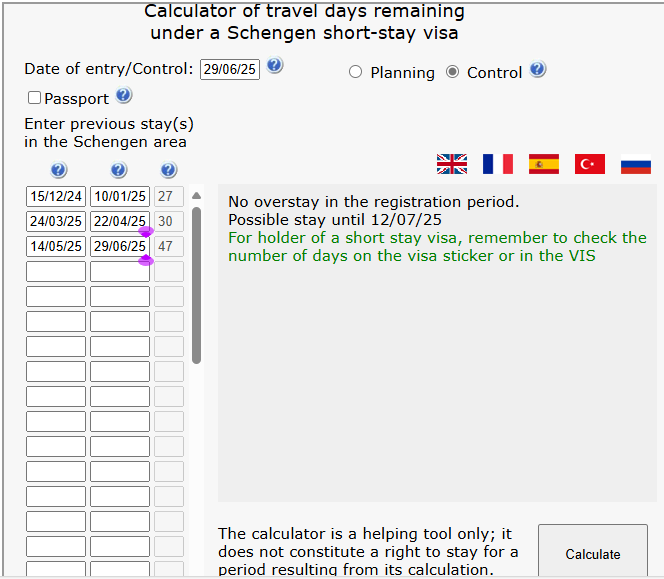Extended travel in the EU
Introduction
The CA provides members with a comprehensive range of information to assist in navigating the entry requirements of commonly visited countries. With the UK no longer part of the EU, various procedures must be adhered to. The processes are generally clearer these days, so don’t let the bureaucracy put you off sailing to and in the EU. We hope you find the following non-member pages useful.
Jump to content
The Regulatory & Technical Services group (RATS) has put together information to help cruising sailors extend their cruising in Europe following the UK’s departure from the EU.
This information is about people, boats fall under a different set of rules.
The Schengen Area comprises all the EU states (with the exception of Cyprus and Ireland) plus Iceland, Liechtenstein, Norway and Switzerland. Citizens of all the EU and additional Schengen Area states enjoy freedom of movement throughout the Schengen Area.
Schengen 90 days
UK citizens who do not have rights by virtue of family connections or otherwise, are not able to visit the Schengen Area for longer than 90 days in any rolling 180-day period.
Travellers holding passports issued by any of the EU states and additional Schengen Area states can travel freely throughout the area. Similarly, spouses (and certain dependents) of these states’ passport holders enjoy the same freedom of movement. Nevertheless, people staying more than 90 days in a single state are usually required to register with the authorities.
Travellers from other non-EU countries may benefit from existing bi-lateral arrangements allowing longer periods of visa-free stays.
The Schengen 90-day visa calculator can be found on the European Commission Short-stay Visa Calculator website.

Shor stay Calculator
Failure to comply with the Schengen 90/180 day rule by overstaying can result in significant fines and/or bans on re-entry to the Schengen Area.
Note you cannot ‘reset the Schengen clock’ by leaving the area for a day; when you have reached 90 days you must leave and not return until you have spent fewer than 90 days in the preceding 180 days.
Details of arrangements for immigration and customs clearance when arriving or departing from EU countries can be found on the Departure and Arrival in UK and EU page available to CA members.
The CA 90 days project
The CA has campaigned to get the 90 day period extended. Further details can be found in our CA campaign news.
How we proceed with this project is presently under review – we hope the intended 'improvement of relationships with EU countries' publicised by the current UK government may offer opportunities to more easily enable longer stays for cruising sailors.
Present options for extended travel in the EU
Cruisers wishing to spend more than 90 days in any 180-day period in the Schengen Area have to make additional arrangements in terms of long stay visas or residency permits which:
- are issued by national governments and hence conditions and procedures may vary;
- are valid only for one country and do not confer any right to travel freely in other EU countries;
- are independent of the 90-day limit and time spent in a country where a long stay visa or residency permit has been obtained does not use up the 90-day allowance in the other countries in the Schengen Area; there can be evidential difficulties in proving time spent in a country under a Visa or Residency – good record keeping is essential;
- generally require evidence that you will not be a drain on the resources of the host country, i.e. you have a place to live, have the financial means to support yourself and have adequate medical insurance. Visas to facilitate tourism also require you to declare that you will not engage in any form of work;
- long stay visas must be applied for in your home country before departure and can take a number of weeks to obtain. Important note: for third country nationals who need to obtain a Schengen 90-day EU-wide visa, these cannot generally be extended whilst travelling;
- Residency permit procedures are generally completed in the country of choice (normally after an initial application for a visa in the home country). Do be aware of the very significant differences between obtaining a visa or permit to stay in an EU country as a tourist and residency which comes with potential tax and other financial implications.
The links in our member area give our best understanding of the possibilities, conditions and procedures for obtaining either a long stay visa or a residency permit for the main cruising countries in the EU. We continue to add feedback and experience from members as it becomes available.
Common Travel Area (CTA)
An arrangement exists between the UK, the Crown Dependencies (Bailiwick of Jersey, Bailiwick of Guernsey and the Isle of Man) and Ireland that permits citizens of these areas free travel between the jurisdictions. The agreement pre-dates UK and Ireland’s membership of the EU and remains unchanged – it was renewed in 2019. Ireland is not a member of the Schengen Area and there is no restriction on the number of days citizens of the CTA states can remain in each other’s countries.
The Regulatory & Technical Services group (RATS) is an executive committee of the Cruising Association (CA) made up of CA volunteers. RATS gives advice and assistance to CA members and others on a voluntary basis but this is subject to the following Disclaimer and should not be regarded as a substitute for appropriate professional advice.
Disclaimer: Any advice has been prepared voluntarily by the Cruising Association, its members and others and they and it have tried to ensure that the contents are accurate. However, the Cruising Association, its employees, contributors and relevant members shall not be liable for any loss, damage or inconvenience of any kind howsoever arising in connection with the use of and/or reliance on such advice, save to the extent required by applicable law.